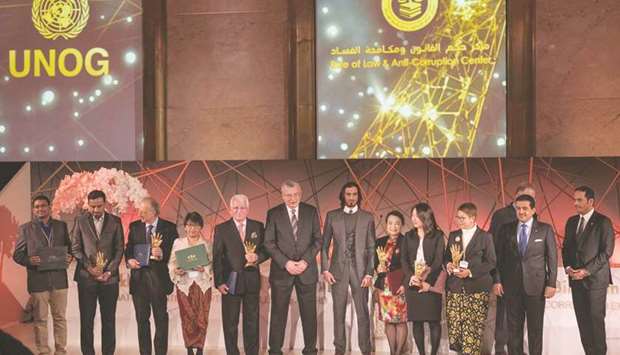The UN Office in Geneva yesterday hosted a ceremony honouring individual and institutional winners from Asia and America for the second edition of Sheikh Tamim Bin Hamad Al-Thani International Anti-Corruption Excellence Award 2017.
The ceremony coincided with World Anti-Corruption Day, where the winners received awards from His Highness Sheikh Jassim bin Hamad al-Thani, Personal Representative of His Highness the Emir, UN’s Michael Muller and Executive Director of the United Nations Office on Drugs and Crime Yuri Fedotov.
The award recognises exceptional contributions to the fight against corruption around the world.
The winners from China, Indonesia, Italy, Jordan, the United States and India received their awards with the support of the competent bodies of the United Nations Office on Drugs and Crime and, in particular, the implementation of the United Nations Convention against Corruption.
Muller said that “we have set ourselves the goal of transforming the world into a better place within a generation through the 2030 Business Plan, so that we can say there is no place for corruption in the 21st century and Sheikh Tamim Bin Hamad Al-Thani International Anti-Corruption Excellence Award is part of this journey.”
For his part, Fedotov said that corruption is like a tsunami, it hits disadvantaged communities and hurts people and communities, adding that corruption was a strong factor in the incidence of other crimes, providing for all kinds of organised crime from drug to human trafficking and from illegal immigration to wildlife and forest-related crimes.
For his part, Qatar’s Attorney-General HE Dr Ali bin Fetais al-Marri, said that Switzerland’s selection of anti-corruption awards comes because Geneva is one of the leading countries interested in human rights issues, which deals with various humanitarian issues and fights racism around the world.
The Supreme Selection Committee on the recommendation of the Evaluation Advisory Board selected six winners in four categories. In the Anti-Corruption Innovation category, India (‘I Paid A Bribe’) won the title in recognition of this innovative corruption reporting platform, the world’s largest anti-corruption public platform.
Since its launch on August 15, 2010, the site has received about 15mn visits and over 36,000 bribes worth around $430mn from more than 1,000 cities and towns, and has been spread throughout Asia, Africa, Europe, South America and North America, while three other countries are launching their own websites.
In the category of research and academic teaching materials to combat corruption, the prize is shared by Prof. Wang from China and Prof. Thomas Speedy Rice from the United States.
Prof. Wang played a pivotal role in creating, directing and promoting anti-corruption practices and protocols through her position as an academic and government advocate.
She was the first person in China to receive a doctorate in international criminal law, and the first to establish a centre to combat corruption as a cooperation between a Chinese university and the United Nations.
Prof. Rice has made significant contributions to the promotion of anti-corruption knowledge through education work, which has had a major impact on raising awareness among the academic community to fight corruption around the world.
He contributed significantly to the educational efforts of the United Nations Convention against Corruption through the United Nations Office on Drugs and Crime (UNODC) initiative and was the main co-ordinator of a number of workshops in many countries.
In the youth creativity category, Indonesia’s Saya Perempuan Anti-Korupsi (SPAK) won for their ‘I Am a Woman Against Corruption’ campaign.
The group succeeded in making important positive changes whether in raising awareness on key concepts, or in improving practices.
They also focused on the role of the family in combating corruption.
SPAK also trained more than 1,300 people on how to raise awareness among citizens of corruption.
In the lifetime award, both Gerardo Colombo from Italy and Mohey el Din al-Touq from Jordan shared the honour this year.
Colombo dedicated more than 40 years of his life to combating corruption and crimes committed by ranking officials.
He was also a teacher for youth when it came to respecting the law and protecting the rights and dignity of the people.
Meanwhile his Jordanian counterpart had a career in politics, diplomacy, and governance.
He occupied high-ranking posts in UN institutions and other international organisations.
Part of this year’s celebration saw the inauguration of a 5m-long memorial designed by Iraqi artist Ahmed al-Bahrani as a testament to the fight against corruption.
The memorial is in the shape of a lifted hand, representing the efforts made by the international community in the field of combating corruption.
The Sheikh Tamim Bin Hamad Al-Thani International Anti-Corruption Excellence Award was established by the Doha-based Rule of Law and Anti-Corruption Centre whose board of trustees is chaired by Attorney-General Ali bin Fetais al-Marri.
Al-Marri announced the establishment of the awards under the auspices of His Highness the Emir Sheikh Tamim bin Hamad al-Thani in 2015, opening the door for all authorities to nominate different groups and individuals for the award.

His Highness Sheikh Jassim bin Hamad al-Thani, the Personal Representative of His Highness the Emir, with the winners of the second edition of the Sheikh Tamim Bin Hamad Al-Thani International Anti-Corruption Excellence Award in Geneva yesterday. Sheikh Jassim presented the awards on behalf of His Highness the Emir Sheikh Tamim bin Hamad al-Thani. The ceremony was attended among others by UN's Michael Muller, Executive Director of the United Nations Office on Drugs and Crime Yuri Fedotov, Qatar's Deputy Prime Minister and Foreign Minister HE Sheikh Mohamed bin Abdulrahman al-Thani and Attorney General Ali bin Fetais al-Marri.
